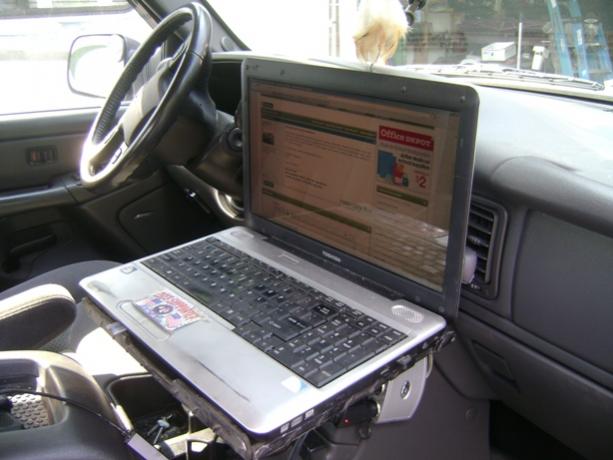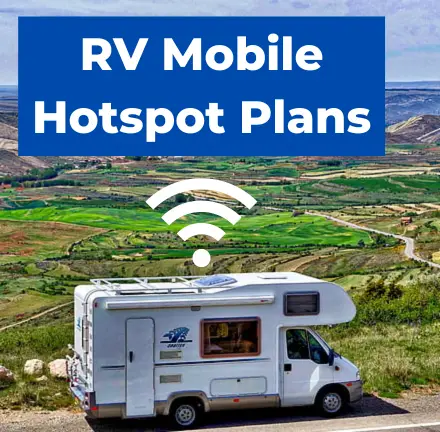RV mobile hotspot plans are essential for those who want to stay connected while on the road. With the rise of remote work and the need for constant connectivity, RVers are increasingly looking for reliable and affordable mobile hotspot plans. A mobile hotspot router and plan allow RVers to get internet access without relying on park Wi-Fi or cell service.
There are several mobile hotspot plans available for RVers, each with its own features and benefits. AT&T, Sprint, T-Mobile, and Verizon offer both cellular data and mobile hotspot plans, ranging from 20 GB of data for $25/mo to 100 GB for $90/mo. Starlink Satellite Internet is also an option for mobile RV and boat use.
Choosing the best mobile hotspot plan for your RV can be overwhelming. This article will provide an overview of the top mobile hotspot plans for RVers, including their features, benefits, and limitations.
We’ll also discuss factors to consider when choosing a mobile hotspot plan, such as coverage area, data limits, and cost. By the end of this article you’ll have a better understanding of the available options and be able to make an informed decision about which mobile hotspot plan is best for your needs.
What are RV Mobile Hotspot Plans?

RV mobile hotspot plans are a type of internet connectivity service designed for people who live in or travel in recreational vehicles (RVs). These plans provide a way to access the internet while on the road, without relying on public Wi-Fi or the availability of traditional wired internet connections.
To use an RV mobile hotspot plan, you need a mobile hotspot device, which is a small device that connects to cellular networks and broadcasts a Wi-Fi signal that you can connect to with your devices. The hotspot device is usually provided by the service provider, but you can also purchase one separately if you prefer.
There are several different types of RV mobile hotspot plans available, each with its own features and pricing. Some plans offer unlimited data, while others have data caps that you need to be aware of. Some plans also include additional features like streaming services or international roaming.
When choosing an RV mobile hotspot plan, it’s important to consider factors like coverage area, data speed, and pricing.
Different service providers have different coverage areas, so you’ll want to make sure that the plan you choose will work in the areas where you plan to travel. Data speed is also an important consideration, especially if you plan to use the internet for streaming video or other high-bandwidth activities.
Overall, RV mobile hotspot plans are a convenient and reliable way to stay connected to the internet while on the road. With the right plan and device, you can enjoy fast and reliable internet access no matter where your travels take you.
Why Do You Need An RV Mobile Hotspot Plan?
An RV mobile hotspot plan will provide you and your companions with reliable internet access while you’re on the road, which is especially important for those who rely on internet access for work or staying connected with loved ones.
For RVers, having a reliable internet connection is essential for staying connected with the outside world and being able to work remotely. Many RVers choose to live on the road full-time, and having a mobile hotspot plan allows them to continue working and living their lives without interruption.
Types of RV Mobile Hotspot Plans
When it comes to choosing a mobile hotspot plan for your RV, there are several options available. In this section, we will discuss the different types of RV mobile hotspot plans and their features.
Cellular Data Plans
Cellular data plans are the most common type of RV mobile hotspot plan. They allow you to connect to the internet using the cellular network. These plans come with a certain amount of data that you can use each month.
Once you reach your data cap, your internet speed may be slowed down, or you may be charged an overage fee.
Unlimited Plans
Unlimited plans are a popular choice for RVers who need a lot of data. These plans offer unlimited data, but there may be some restrictions.
For example, your internet speed may be deprioritized after you reach a certain amount of data usage. This means that your connection may be slower during times of high network traffic.
Prepaid Plans
Prepaid plans are a good option if you want to avoid a long-term contract. These plans allow you to pay for your data upfront, and you can choose how much data you want to buy.
Once you use up your data, you will need to purchase more.
Multiple Carrier Plans
Multiple carrier plans allow you to use multiple cellular networks. This can be helpful if you travel to areas where one network has better coverage than another.
These plans are usually more expensive than single carrier plans.
When choosing an RV mobile hotspot plan, it’s important to consider your data usage, budget, and network coverage. Some plans may have data caps or network management policies that could affect your internet speed.
It’s a good idea to check if the plan includes a hotspot router or if you will need to purchase one separately.
The Best RV Hotspot Plans

When it comes to choosing the best RV hotspot plans, there are several options available in the market. Here are the top four RV hotspot plans that are worth considering:
Verizon
Verizon is known for its extensive coverage and reliable network. They offer several hotspot plans that cater to the needs of RVers. Their unlimited hotspot plan is a great option for those who require a lot of data.
It costs around $80 per month and provides unlimited data with a 15GB high-speed hotspot.
AT&T
AT&T is another popular option for RVers. They offer several hotspot plans with varying data limits.
Their unlimited plan costs around $85 per month and provides unlimited data with a 30GB high-speed hotspot.
AT&T also offers a prepaid hotspot plan that costs around $35 for 2GB of data.
T-Mobile
T-Mobile is known for its affordable hotspot plans. They offer several plans that cater to the needs of RVers.
Their Magenta Max plan costs around $85 per month and provides unlimited data with a 40GB high-speed hotspot.
T-Mobile also offers a prepaid hotspot plan that costs around $50 for 10GB of data.
Starlink
Starlink is a new entrant in the RV hotspot market. They offer satellite-based internet services that are ideal for RVers who travel to remote areas.
Their internet speeds are impressive, and they offer unlimited data with no data caps. However, the initial setup cost can be quite high, and the service is not available in all areas.
Choosing the Right RV Mobile Hotspot Plan
When it comes to choosing the right RV mobile hotspot plan, there are several factors to consider. Here are some things to keep in mind:
How Many Devices Will You Be Connecting?
Consider how many devices you will be connecting to your mobile hotspot. If you have a large family or group, you may need a plan that allows for multiple connections.
Some plans may limit the number of devices that can be connected at once, so make sure to check the details before making a decision.
Mobile Hotspot Battery Life
Another important factor to consider is the battery life of your mobile hotspot device. If you plan on using your hotspot frequently, you’ll want to make sure that the battery can last for an extended period of time.
Some devices may also have the option to connect to an external battery pack for extended use.
Does The Carrier Offer Coverage Where You Live and Travel?
Make sure to choose a carrier that offers coverage in the areas where you live and travel. Some carriers may have better coverage in certain regions, so do your research before committing to a plan.
Consider Your Usage and Speed Requirements
Think about your usage and speed requirements when choosing a plan. If you plan on using your hotspot for streaming, gaming, or working from home, you may need a plan with higher speeds and data limits.
If you only plan on using your hotspot occasionally for basic browsing and email, a lower-tier plan may suffice.
Do You Need 5G RV Hotspot Service?
Consider whether you need 5G RV hotspot service. While 5G is becoming more widely available, it may not be necessary for everyone. If you plan on using your hotspot for high-bandwidth activities then 5G may be worth the investment, while a 4G plan may be sufficient if you only need basic internet connectivity for things like email and basic web browsing.
Frequently Asked Questions
The best RV internet plans depend on individual needs and preferences. Some popular options include mobile hotspots, satellite internet, and campground WiFi. It is recommended to research and compare plans from different providers to find the best fit for your specific situation.
Several providers offer unlimited data plans for RVs, such as AT&T, T-Mobile, and Verizon. Some plans may have data caps or throttling after a certain amount of usage, though. Read the fine print and compare plans to find the best option for your needs.
The top-rated mobile hotspot for RVs is the Netgear Nighthawk M1, which is offered by AT&T and other providers. It offers fast speeds and reliable connectivity, making it a popular choice among RVers.
Yes, satellite WiFi is an option for RVers who need internet access in remote areas. Providers such as HughesNet and Viasat offer satellite internet plans for RVs. However, it is important to note that satellite internet can be expensive and may have slower speeds than other options.
Full-time RVers stay connected to the internet through a variety of methods, such as mobile hotspots, satellite internet, and campground WiFi. Some may also use signal boosters or antennas to improve connectivity in remote areas. It is recommended to have multiple options for internet access to ensure reliable connectivity while on the road.
While some providers offer unlimited data plans for RVs, it is important to read the fine print and understand any potential data caps or throttling. Truly unlimited hotspot plans may be expensive or have slower speeds than other options, so you should research and compare plans to find the best fit for your specific needs and budget.

